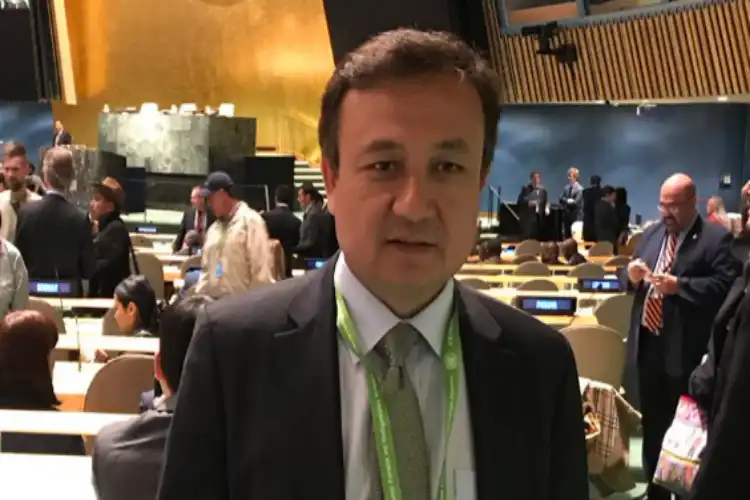
Tripti Nath/New Delhi
Former U.S. Deputy Ambassador to the United Nations Kelly Eckels Currie is convinced that the story of Uyghur activist Dolkun Isa, exposes the dangers of China’s growing influence in the world.
In her foreword to the keenly awaited book, The China Freedom Trap- The story of an Uyghur Fighting Chinese Hegemony with an INTERPOL Red Notice by Har-Anand Publications, Ambassador Currie says, “ It is an honour to call Dolkun Isa my friend. I am proud to have worked alongside him to highlight China’s dangerous ambitions to subjugate the Uyghur people and undermine human rights worldwide. This is Dolkun’s story: both a cautionary tale and a tale of the triumph of human dignity.‘’
Dolkun Isa, a German national, and President of the World Uyghur Congress, has braved an INTERPOL Red Notice for 21 years leading to detention and expulsion from many borders. The Uyghurs, mostly Muslims, are the major ethnic people of Xinjiang, the largest region in the People’s Republic of China. Isa paid a very heavy price for standing up for the rights of the Uyghurs -persecuted by the PRC for many years and demonstrated remarkable grit and determination to develop an activist international movement for the Uyghurs. His mother, Ayhan, died in a Chinese concentration camp.
The former envoy has given a graphic account of China made hurdles that Isa faced in 2018 when he wanted to register to attend a UN event, the Permanent Forum on Indigenous Issues. At that time, Ambassador Currie had just joined the U.S. Mission to the United Nations (USUN) in New York as the Ambassador to the Economic and Social Council and a Deputy to Ambassador Nikki Haley. She was directly responsible for making sure the UN granted Dolkun access to the conference. She followed up with the U.S. mission in Geneva and Dolkun received a letter from the Forum a week or so later that his registration had been confirmed.
On the first day of the Forum, Ambassador Kelley welcomed Dolkun to his office and got an update from him on the increasingly dire situation facing the Uyghur people living in China.
Ambassador Kelley has narrated how she accompanied Dolkun to the UN’s badge office and how she had to intervene. They were told that Dolkun could not get a badge due to a “ security issue’’. They were then referred to the UN’s Department of Safety and Security (UNDSS).
In her gripping account of their experience over a badge, Ambassador Kelley says that she contacted the US Mission Security Chief Kenny Greenblatt and asked him to contact UNDSS. “ When Kenny got back to me, it was with disturbing news. UNDSS said that Doklun had been flagged as a ‘terrorist threat’, “ and would not be able to get a badge.’’
Ambassador Currie writes,“Rather than check with INTERPOL-a UN agency, UNDSS put a flag on Dolkun’s name based solely on China’s false allegations'. The USUN did not stop at this, It provided UNDSS verification from INTERPOL that Mr. Isa was not subject to a Red Notice but they still refused to lift the flag. The German mission to the UN also actively weighed on his behalf but what finally worked in Dolkun’s favour is another interesting story.
She writes, “Ultimately, over the course of nearly two weeks, we had multiple meetings with both UNDSS and the office of the Secretary-General Antonio Guterres on this matter. UNDSS refused to issue Mr. Isa a badge without direct instructions from the Secretary-General. I heard from one contact in the Secretary General’s office that the Chinese Permanent Representative had screamed at Guterres over the matter, threatening him and the UN with repercussions if Dolkun was given a badge.’’
It was a race against time and they only got two days- notice for Dolkun to pick the badge. By then, Dolkun had already returned to Germany. “Fortunately, we were able to convince him to turn around and come back. On the last day of the Permanent Forum on Indigenous Issues, I finally escorted Dolkun Isa into the UN headquarters building.”
The Ambassador recalls that Dolkun “arrived in time for the final session of the Forum, at which he rose to give a statement, only to be shouted at by Chinese participants.’’
